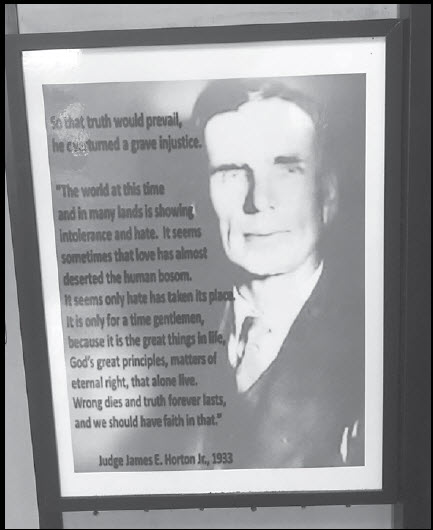 By: Ali Elizabeth Turner
By: Ali Elizabeth Turner
Ninety years ago, on June 22, 1933, one of the most famous, controversial, and critical judicial decisions of the 20th century was made in the second floor southwest courtroom of the Limestone County Courthouse in Athens, AL. This was none other than the brave act of His Honor Judge James E. Horton, when he set aside the guilty verdict of Haywood Patterson, one of the “Scottsboro Boys” who had been falsely accused of rape by two young white women. The alleged incident happened in Scottsboro, AL, and the trials took place in Decatur and Athens.
Horton was in his second term as a circuit judge, and his decision cost him his career. He was the son of a former slaveholder who became a probate judge, and his mother was the daughter of a Confederate general. Nonetheless, it was his mother who taught him the phrase that would guide him through a controversial decision that occurred smack dab in the middle of Jim Crow. She taught him as a boy, “Let justice be done though the heavens may fall,” and that is just about what happened.
Judge Horton was the quintessential Atticus Finch-type of lawyer and judge. He was soft spoken and even tempered, rarely raising his voice to anyone. However, on the third day of the trial he got wind of a plan to lynch the accused and nearly hollered when he stated that he “had absolutely no patience with the mob spirit.” He denounced as “cowardly murderers” those who would have lynched the accused if they could. Judge Horton was convinced the young women were lying, and privately heard one of the doctors attending them attest to the fact that there was no medical evidence of rape. He also made it clear to those in the courtroom that he had not only assigned police protection to the accused, he had instructed the police to shoot to kill anyone who tried to bring them harm.
Horton’s decision came as a shock to all, the defense and the prosecution alike. He stood on the steps of the courthouse and announced his decision, and it was a shot of blind and pure justice that was literally “heard round the world.” The story was carried in major newspapers. His Honor received a tsunami of telegrams both pro and con regarding his decision, and he kept them in a lard bucket. He also kept the fountain pen he used to sign the paperwork describing his decision, and was defeated in the next election.
At the time of the decision, Judge Horton lived in the antebellum mansion that stood on the property that is currently the site of City Hall in Athens. He numbered every board in the building, disassembled the home and moved it by wagon out to Greenbrier, and today it stands across from the Toyota-Mazda plant. Horton spent the rest of his life raising prize-winning cattle and teaching his children to “do justly, love mercy, and walk humbly” with their God. These days, a bronze statue of the man (paid for by the citizens of Athens-Limestone County) stands not far from the spot where he changed history, and James Horton deserves an honored place in American history, forever. May his courageous chronicle never be disputed by those who would revise it.










 June 20, 2025
June 20, 2025



